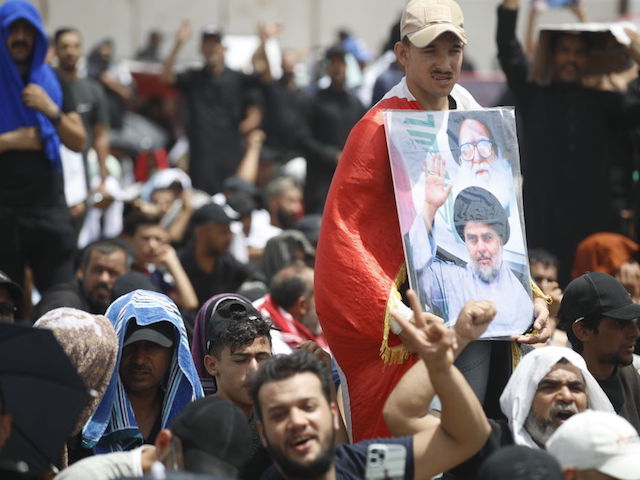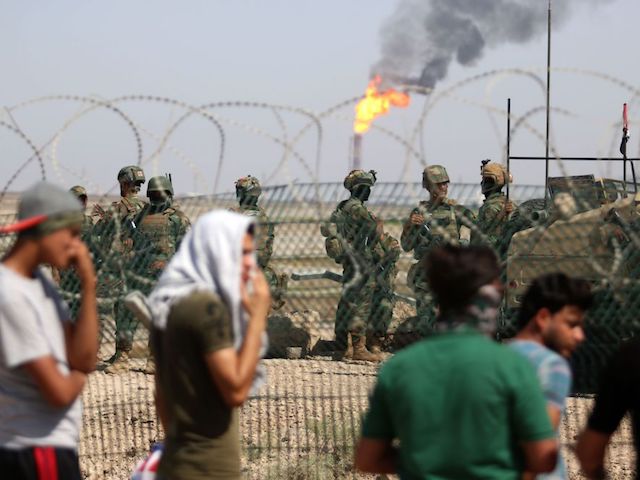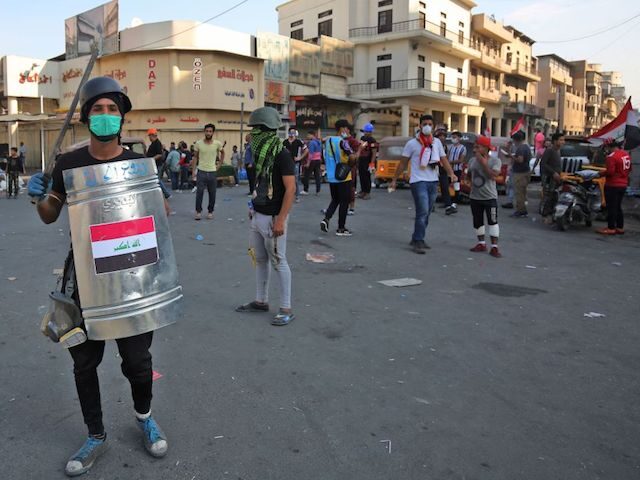IRAQ – For President Joe Biden, a renewed Middle East crisis lurks just as the Afghan withdrawal debacle enters the rearview mirror and record-high gas prices continue to retreat.
Long-simmering tensions in Iraq, and complications with or without an Iran Deal redux, are set to amplify strains on global crude supplies. The recent OPEC+ announcement of curbs in oil production aims to stave off any further price cuts. A lack of American will to engage these issues could ensure a fresh surge of prices at the pump and push inflation higher.
Writing this from Iraq, you cannot help but hold your breath as the area careens from one calamity to the next. The first nail-biter is that Iraq has yet to see a transition of power after the October 2021 elections. This has led to an increasing tempo of discord between Iran-aligned factions, versus the bloc led by anti-Iran Shia cleric Muqtada al-Sadr, joined by Kurdish and Sunni parties, as both camps vie to form a governing majority.

Supporters of Iraqi Shiite cleric Muqtada Sadr take part in Friday prayers outside the parliament building in the Green Zone of the capital Baghdad, as they continue to protest against the nomination of a rival Shiite faction for the position of prime minister, on August 12, 2022. (Murtadha Al-Sudani/Anadolu Agency via Getty Images)
Tensions reached a fever pitch late last month, after Sadr withdrew his Saairun party from parliament (the largest), called for snap elections, and announced his “retirement.” Mirroring past events at the U.S. Capitol and in Sri Lanka, his disenfranchised supporters stormed Baghdad’s heavily-fortified Green Zone, occupying the Iraqi Parliament and cooling off in the Republican Palace swimming pool. Rumors of an imminent collapse took hold as Iraqi security forces failed to quell firefights between the Iran-backed and Sadr-aligned Shia militias. Iraq returned from the brink only after Sadr instructed his populist movement to vacate key areas. By that time, at least 30 Iraqis lay dead.
These clashes bring Iraq no closer to a resolution. The U.S. can afford to disregard Iraq’s political process only at its own peril.
Iraq, second by OPEC crude production, boasts almost half of Saudi Arabia’s output. A Reuters report in 2018 said Iraq sought to up exports from under 5 million barrels per day to 8.5 mbpd “in the coming years.” Fast-forward this summer, and Reuters now says Iraq’s oil ministry pledged to boost oil flow to 4.58 million bpd. Goals over the next several years vary between 6 to 7 million bpd — far short of even 2018’s aim. It’s clear that Iraq has room to grow, if President Biden will help prioritize stability. Sadr’s movement blocked oilfield roads and surrounded a refinery; Iran’s proxies often hit energy infrastructure with rockets and drones. RBC Commodities told Business Insider that unrest could cause one million barrels per day to “come offline.”
A guiding American hand in shoring up reliable Iraqi electricity production would free the nation from dependence on Iranian electricity and help mollify civil unrest over a lack of basic utilities.
Regardless of Baghdad’s parliamentary outcomes, the second looming issue is a growing legal logjam in the Iraqi Kurdish oil sector. Over this year, Iraq’s Iran-leveraged judiciary has tightened the screws on Iraqi Kurdistan’s independent oil industry. The semi-autonomous Kurdish enclave — hailed as an oasis of stability in the region since the 2003 fall of Saddam — relies on independent exports of some half-million barrels per day. Iraq’s top court rules that these independent sales are illegal. Iraq’s judiciary indicates it will move against foreign oil firms and Turkey for extracting and exporting oil and gas from the Kurdistan Region.

Protesters demonstrate as Iraqi soldiers stand guard oil fields in al-Qurnah, some 100 kilometers north of Basra, southern Iraq, on July 14, 2018. (HAIDAR MOHAMMED ALI/AFP via Getty Images)
Dr. Bilal Wahab, a leading expert on Iraqi Kurdistan at the Washington Institute for Near East Policy, and Matthew Amitrano, a State Department analyst, recommend the U.S. step in and help Kurdish authorities and Baghdad to pass new oil legislation. They prescribe short-term consensus-building agreements to offer sorely-needed clarity to the foreign producers key to bringing Iraqi Kurdish oil to world markets. The Kurds might then be able to proceed with plans to extract 40 billion cubic meters of natural gas per day and pipe it to Europe via Turkey. This would reduce E.U. dependency on Russian supplies, and counter Russia’s vast efforts to exploit Western weakness in Iraq’s energy sector.
Short-term, Kurdish officials say, this “political” legal battle is not an existential issue for their region, but there is growing cause for concern.
Reuters reported this month that without ongoing investment, Kurdish crude production could “halve,” as it dips by 20 percent per year as wells are depleted. From the rise of ISIS in 2014 onward, the Kurds made payments to oil producers while facing a trifecta of ISIS, millions of refugees, and a block of Baghdad’s funds. In spite of this, numerous oil firms find Iraqi Kurdistan to have diminishing returns and ever-higher risk. Halliburton, ExxonMobil, and others have already announced their divestment under the growing cloud of potential litigation. Further south, Iraq’s oil-rich Kirkuk comprises a huge chunk of Iraq’s exports, but it also faces a disputed status over a long-delayed referendum on its final status as a part of the Kurdish region or Iraq.
The imbroglio facing Iraq, Kurds, and their neighbors may at first appear obscure and tough to follow, but OPEC’s decision proves that every hundred thousand barrels of oil matters.
Unfortunately, what happens to a tanker terminal in Saudi Arabia or a pipeline in Iraqi Kurdistan can reverberate through higher costs for everyday Americans. Next door, Iran wields this potential for blackmail and uses this price pressure to incentivize a renewed nuclear deal that would lift US sanctions — or Iran may simply enjoy higher revenues from existing illicit oil sales at steeper prices. A nuclear deal would not curb Iran’s malign activities in the region.

30 August 2022, Iraq, Baghdad: Armed fighters of Saraya al-Salam brigades, affiliated with Iraqi influential Shiite cleric Muqtada Al-Sadr, withdraw from their protest site near the parliament building inside Baghdad’s Green Zone. (Ameer Al-Mohammedawi/picture alliance via Getty Images)
Meanwhile, OPEC Plus’ decree to slash output by 100,000 bpd — after pledging a 100,000 bpd boost in the wake of President Biden’s Middle East tour in early August — is an embarrassing reversal of his nominal diplomatic success. OPEC states that further cuts could ensue to offset any Iran deal that would open their crude spigots.
Biden enjoys buoyed approval ratings over recent weeks, in part thanks to a cooling-off of local gas prices. According to FiveThirtyEight’s polling averages and the U.S. Department of Energy gas price average, Biden’s 36 percent approval jumped to 41 percent, roughly over the same period that gas dropped from around five to four dollars per gallon.
Lest these improved fortunes be only temporary, it may not take long until the Biden Administration is again hard-pressed to bring relief to struggling Americans. The U.S. must start now by realizing the high-stakes issues at play in Iraq and Kurdistan, and should act accordingly.
Zach D. Huff is a Kurdish affairs expert and a combat veteran. He holds an MA in Middle Eastern Studies from The University of Chicago and has reported from Iraq, Syria, Turkey, and Iran since 2015.

COMMENTS
Please let us know if you're having issues with commenting.